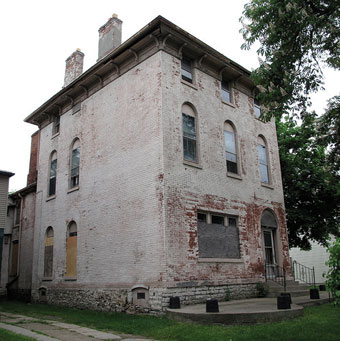A Stay on Busti Avenue Demolitions
by Jack Foran

The preservationist group Campaign for Buffalo History, Architecture, and Culture asked for and got a temporary restraining order for two weeks on the planned demolition of seven houses to make way for an enlarged Peace Bridge plaza and new Duty Free store.
Time for attorneys on both sides of the matter to prepare written and oral arguments on substantive questions, such as, do the demolitions require permits under state environmental protection laws, which goes to a deeper question as to whether the Public Bridge Authority is a state agency. The PBA takes the position that, as a bi-national entity, it isn’t a state agency, and so doesn’t require permits for its “internal operations.” A related substantive question is whether extension of the bridge plaza into a former residential territory ought to be considered a PBA internal operation.
A related state requirement would be a legitimate environmental impact statement on the project, including not just the environmental impact of the proposed demolitions but of the enlargement of the plaza and construction of the new Duty Free. Last week the PBA released a “voluntary” and “segmented” environmental assessment document just on the proposed demolitions, considered apart from any “potential” further development.
The Campaign’s petition was built around housing preservation issues, but a legitimate environmental impact statement would no doubt get into the even more vital matter of a respiratory health crisis among children and adults in the Peace Bridge area related in part to diesel emissions from Peace Bridge traffic. The extension of the bridge plaza would introduce diesel traffic deeper into the surrounding community and likely increase diesel emissions affecting the community.
Attorney Kevin Hogan represented the PBA. Among his arguments against the stay and for immediate demolition were that the properties were dilapidated beyond saving and constituted a blight on the neighborhood, and so needed to be removed, and given that the PBA was prepared to demolish at any time now, the petitioners were late to the game coming in to intervene and hold up the project.
State Supreme Court Justice Joseph R. Glownia issued the stay. He questioned the need, given that the properties have been dilapidated for years, but were not ostensibly in imminent danger of collapse, “to save the neighborhood from its blight tomorrow.” As for the argument about the petitioners coming in late, he noted that cases such as the present one “never get to the court until the shovel is in the ground.”
Arguing for the stay were attorneys Richard G. Berger and Richard J. Lippes.
Further written arguments are due July 3. The next court session is scheduled for July 6.
blog comments powered by Disqus|
Issue Navigation> Issue Index > v11n25 (Week of Thursday, June 21) > Week in Review > A Stay on Busti Avenue Demolitions This Week's Issue • Artvoice Daily • Artvoice TV • Events Calendar • Classifieds |









 Current Issue
Current Issue